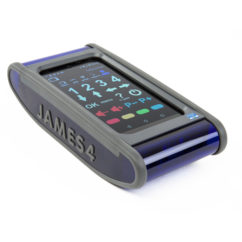Description
MOVAID (Mobility and Activity Assistance Systems for the Disabled) involves the development of a multi-functional robotic assistance system for residential care.
MOVAID seeks to offer all users, but especially the disabled and older user, greater comfort and enjoyment in accessing non-specialised, consumer products. This will be achieved by taking two different (but related) approaches: severely disabled or bed-ridden users will be catered for by the development of a multi-purpose, modular robotic assistance system, which will give users access to consumer products via activity workstations; the majority of users will be catered for by the development of dedicated interfaces for consumer products. The MOVAID philosophy starts from the premise that, when facing technology, all users are disabled.
During the lifetime of the project, a variety of software and hardware will be delivered, including: design and technical guidelines for robotic systems and for interfaces for kitchen appliances; a mobile unit equipped with a robot arm, a vision system and an automatic navigation system; two activity workstations; and a range of friendly, modular, and expandable user interfaces (possibly M3S-based) suitable for all users of kitchen appliances or robotic systems.
Technical Approach : There are four main innovative aspects of the project. The first is that MOVAID will take a dual approach to the needs of all potential users (the robotic system and the dedicated interfaces). The second is that the robotic system will be modular and mobile, allowing it to combine with activity workstations (this will reduce costs for users). The third is that the focus of the project will be on the satisfaction and pleasure of interaction, not only on efficiency and effectiveness. And the fourth is that MOVAID technology will make new appliances (i.e. new products already under development which will appear on the market in the next two-five years) more accessible to all users.
The project will start from a deep analysis of user requirements and from the development of possible scenarios regarding household use. The outcome of this initial stage, will be the basis for the definition of the preliminary technical specifications of MOVAID. A critical design review with users will lead to final design requirements and to the implementation of the various sub-systems and components. Then the whole MOVAID system will be integrated and tested. Finally, user trials will take place in Italy, France and Switzerland with a variety of potential end users, ranging from elderly and moderately disabled users to severely disabled users.
Impact and Expected Results : The main results from the MOVAID project can be summarised as follows:
-
to produce an integrated system for residential care, which includes activities related to food preparation, which can not only increase the level of independence of a disabled or elderly user but also can optimise their interaction with technical aids by maximising ease and satisfaction of use;
-
to provide the large and small enterprises participating in the project with accurate information regarding user needs;
-
to help the partners of the consortium involved in robotis to learn how to transfer some of the fundamental qualities of consumer products into robotic systems. This will be achieved by including satisfaction, comfort and aesthetic considerations in system design, and in interaction and interface design;
-
to exploit the growing market in food preparation products by developing interfaces for new kitchen appliances;
-
to exploit the industrial opportunity of reducing the cost of robotics. This will be achieved through the creation of distributed systems, in which light (reduced function) robots can be combined with ‘smart’ appliances.





